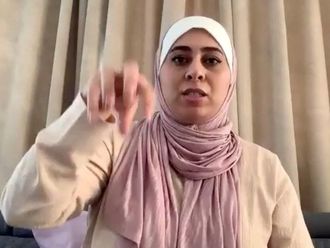Bab Al Salama Crossing, Syria: Terrorised by shelling and air strikes, tens of thousands of Syrians have packed up and crossed the border to Turkey, but some have also been forced to take refuge at the actual crossing.
Hundreds of people are stranded in what was once a bus station on the Syrian side of the Bab Al Salama crossing. Just across the border on the Turkish side, their compatriots are living in a massive refugee camp, complete with tents, satellite dishes and a mosque.
But the camp is now full, and those without a passport and the means to pay their own way in Turkey have found the border crossing bus station is the farthest from the fighting that they can get.
Ali, 34, brought his family from nearby Aazaz five days ago. His three children, aged two, five and seven, play near their father on a mat laid on the pavement where travellers once waited for shuttle buses.
“We came because of the shelling. At first it was bearable, it was fairly light, but after the air strike that demolished several homes I started to change my mind,” he said.
His mother, 55-year-old Umm Hassan, her blue eyes wide with anger, described seemingly endless sleepless nights.
“We are not the Free Syrian Army, we are regular citizens who have children and wanted to live in peace,” she said.
“We used to hold our children up to the sky to show we are civilians, but the shelling never seemed to stop.”
Since the family arrived, they have been trying to find a way across the border, but they do not have passports and have been told that formal refugee camps are full and they will have to wait for more space to open up.
Even in the relative safety of the border Ali feels uncomfortable, worried that the makeshift camp will eventually be targeted by the regime.
“We are waiting for anyone who can get us out of here, to anywhere at all.”
Mahmud Khalaf, from the village of Haritan near Aleppo, is sitting nearby on a chequered blanket.
His wife rocks her weeks-old baby in a crib with one hand while she bounces two-year-old Mohammad on her knee.
They arrived a week earlier and have no idea when they might be able to move to a proper camp.
“We just want someone to tell us when we will be able to leave,” Khalaf said. “We brought nappies and some baby milk from home, but we are starting to run out, and we don’t know where we’ll get more from.”
The rebel forces who control the Syrian side of the border oversee the area informally, ensuring that theft and assault are not a problem for now.
And they also help to distribute food that comes to the camp from both sides of the border, mostly from Turkey in the form of donations from local or international organisations.
But the camp is not under the formal administration of any body or charity, and the refugees stranded there say they feel abandoned.
“Tell me, should I go back to Marea?” asked a woman who declined to give her name. “I left because of the shelling and the fighting, but here I feel afraid too, and the situation is awful.”
A water tanker has been set up on the edge of the bus station-turned-camp, and toilets are available. But there are no showers, food distribution is irregular and chaotic, and privacy is non-existent.
The families have taken over every available part of the pavement, laying out mats or rugs that represent their own claim to personal space.
They have a few belongings piled up on the outskirts of their new homes — a fan, a bag of potatoes, a handbag or two.
Children run around with little to do. A boy writes graffiti on a wall: “The free city of Aazaz.” A girl in a dirty orange dress with a white ribbon trim spins around and around, tracing the edge of her skirt as it flies up.
Even in the shade of the bus station roof the heat is oppressive, and most of those sheltered underneath it are laid out on the floor, trying to keep cool.
Zeinab, 18, her pale face framed by a black headscarf, is trying to soothe six-month-old Amira, her second child.
“We left Marea because we couldn’t find anything for the children — food, medicine,” she said. “But we don’t have any way to get across the border, and life here is unbearable.”











